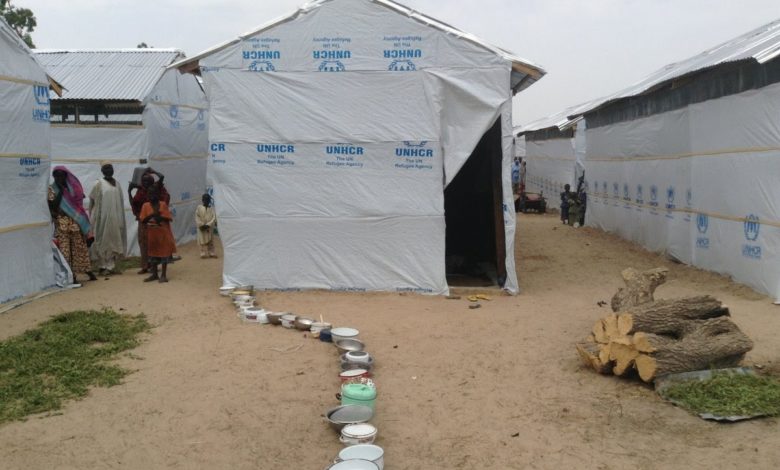Tougher Times Ahead For IDPs Following Recent Dikwa, Marte Attacks
Standards of living in Northeast Nigeria have depleted due to terrorist attacks, and things are about to get tougher after recent attacks in Dikwa and Marte, in Borno State, threaten humanitarian aid.

On March 2, reports of multi-pronged attacks by the Islamic State West Africa Province (ISWAP) insurgents on the town of Dikwa, and at Marte on Feb. 15, have widened the gap in humanitarian assistance in the region.
Both communities are in Borno State, Northeast Nigeria where insurgency has been ongoing for over a decade.
HumAngle reported that this year alone, Dikwa has been attacked by the terrorists four times, with two of the attacks happening within a span of 24 hours.
Following the attacks, residents and displaced persons fled to Maiduguri and Cameroon despite ISWAP’s assurance that the attack was targeting only the military.
The terrorist group further asked people to choose between staying in the town and going to Maiduguri, while providing cash to encourage them to pick the former option.
The attacks also led to the evacuation of aid workers out of humanitarian hubs in Monguno and Ngala by the United Nations (UN).
The organisation had temporarily withdrawn a number of workers after the previous attack on Dikwa that happened on Feb. 20.
The direct and immediate impact of these attacks is the displacement of thousands, with some having to seek refuge from the attacks twice within the span of less than a month, from Marte and then from Dikwa.
The UN Office for the Coordination of Humanitarian Affairs (OCHA) has estimated the population of people in Dikwa to be around 114,000, with over 76,023 displaced.
The population in Dikwa relies heavily on humanitarian aid for livelihood.
Non-Governmental Organisations (NGOs) providing aid in the regions affected have already expressed concern on the possibility of thousands of Internally Displaced Persons (IDPs) being cut off from life-saving aid.
The insurgents in the course of their attacks set a hospital and several aid agencies ablaze, the UN said.
The Nigerian International NGO Forum (NIF), a day after the Dikwa attacks, warned that those in the affected and surrounding communities could experience increased hardships due to the logistical difficulties of getting aid across.
This is because of the overrunning of the town of Dikwa and the proximity of the humanitarian hubs to the location.
Victims affected by the attacks
The attack by ISWAP on Marte caused an influx of 3,380 new IDPs from Dikwa, according to data from UNOCHA.
About 2,084 of these IDPs are children, 1,168 are adults and around 128 are elderly persons.
There are 17 camps in Dikwa, with a population of 61,025. Shelter remains the utmost priority for the displaced, followed by water, sanitation and hygiene.
The UN Resident and Humanitarian Coordinator in Nigeria, Edward Kallon has reemphasised concern for the safety and security of those in Dikwa, from the IDPs to the residents of the community outside the camps.
According to Kallon, the attack will affect assistance provided to nearly 100,000 people, and an increased risk of COVID-19 spreading further in the state.
Following the attacks on Feb. 14, the UN began an immediate assessment to inform all developmental and government partners in the region carrying out operations.
The UN has identified the primary needs of those affected as non-food items, health and nutrition, water, sanitation and hygiene (WASH), and food security.
But following the most recent attacks in Dikwa on March 1, the ability of the humanitarian agencies to provide these became significantly reduced.
International NGOs have continued to call on the terrorists to respect international and human rights laws, stating that humanitarian workers should not be made targets in the process of carrying out the fundamental work of assisting the victims of their attacks.
Support Our Journalism
There are millions of ordinary people affected by conflict in Africa whose stories are missing in the mainstream media. HumAngle is determined to tell those challenging and under-reported stories, hoping that the people impacted by these conflicts will find the safety and security they deserve.
To ensure that we continue to provide public service coverage, we have a small favour to ask you. We want you to be part of our journalistic endeavour by contributing a token to us.
Your donation will further promote a robust, free, and independent media.
Donate HereStay Closer To The Stories That Matter




